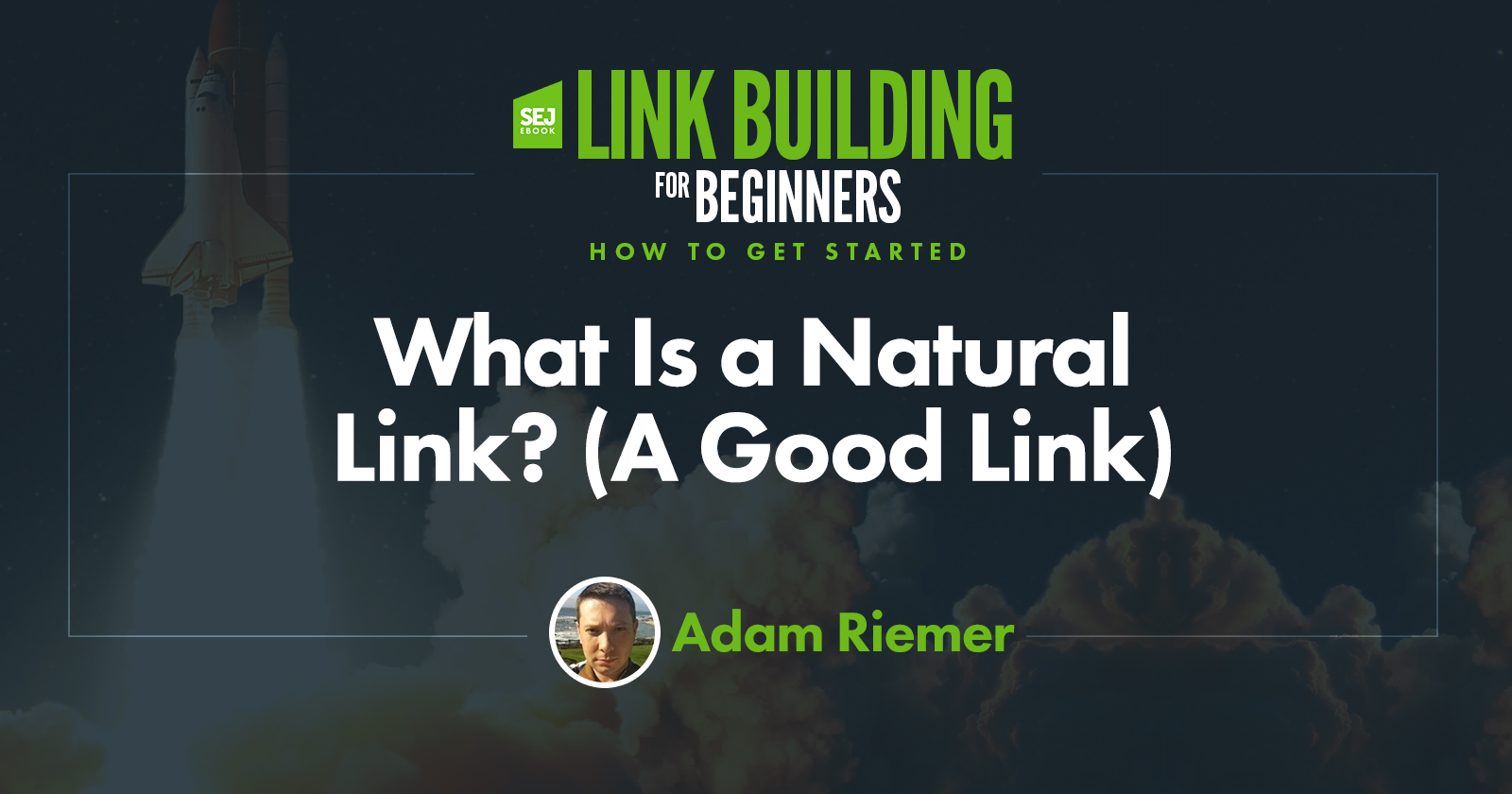In the SEO world, terms like natural links, quality links, and good links are thrown around like crazy.
Whether you’re going into a client pitch, attending a search marketing conference, or your boss asks you why you aren’t getting quality links, it’s important to know (and be able to explain) all the different types of links.
This chapter will help you:
- Understand each type of link by providing you with definitions.
- Determine which types of links may be able to help boost your rankings.
- Figure out which types of links you may want to add to a disavow sheet.
Although there is normally debate on specific types of links (.edu and relevant, manually-updated directories, for example), this will be a good baseline for you to use.
Types of Links
Natural Links
A natural link is one that occurs organically (not easily seen as being placed by your company).
Natural links don’t:
- Have tracking parameters.
- Exist within sponsored or paid content.
- Redirect through JavaScript or monetization tools.
A natural link exists as a reference to a piece of content, website, or source.
Unnatural Links
Unnatural links are any links that are paid for.
These types of links can be placed and tracked by PR firms and media buyers, or monetized through affiliate programs, CPC campaigns, influencers, or monetization scripts.
If these links aren’t nofollowed, Google can potentially take manual action on your site or your site could be negatively impacted algorithmically (most likely by Penguin), because they are not earned/natural.
What are unnatural links? Links:
- With tracking parameters (e.g., UTM source and medium).
- Within sponsored content on a site (because search engines do not know who paid for the content to be placed).
- From sites using monetization scripts because scripts say you get paid for linking to retailers.
You can find these in the site’s code, outbound redirects, and other mappable techniques.
Semi-natural Link
On occasion, you’ll discover a “mixed” link pattern. For example, you may find a natural link that uses tracking parameters.
Let’s say you click through from an influencer who has been paid to share a link. That link will lead to the landing page that may have the tracking parameters in place.
Bloggers, aggregators, and others who follow that link may copy and paste it directly into their site giving natural links that also have these parameters. This could result in an unnatural but organic link scheme.
To help resolve this, make sure that as a person reaches your site through a tracked link, you set a redirect to pass the parameters but also resolve to the natural page structure. (i.e., the utm_campaign redirects to a version without any UTM parameters).
Now you’ll have the standard and non-tracked URL as the one they use and be able to properly attribute sales, traffic, and leads back to the original site.
You can still measure the halo effect of additional links and exposure by pulling a link acquisition report and crawling/scraping the likes, shares, and retweets from the initial influencer.
What Are Quality Links?
Quality links are links that come from high-quality sites.
This definition will change depending on the quality of the SEO you’re talking to. Here is what I look at to determine the quality of a website:
- The site is niche, or at least has a regularly updated section about the topic.
- There are no outbound links to adult, illegal, payday, or scam sites.
- You won’t be able to see that they allow sponsored content (with the exception of clearly marked advertorials).
- Media kits and publicly viewable advertising sections do not have a price for or mention of text links or backlinks.
- Finding them in the Google news feed is a good sign that they are trustworthy or high quality in Google’s eyes.
- Acquired links will be by staff writers and not contributors. Contributors can be bought more easily and many large publications have begun nofollowing their links. Do a Google search for Huffington Post and nofollow and you’ll see multiple discussions from when they flipped the switch.
- The links come from body copy. That has to be earned – unlike blog comments, forum mentions, press releases, and other areas where anyone can easily build or buy links.
What Makes a Good Link?
A good link is different than a quality link. It can be any type of link that can have a positive impact with a bit less risk.
The factors of a good link vs. bad link can also change based on the type of SEO you’re doing local vs. national and country-specific vs. international – Russia and Yandex vs. the UK and Google).
A good link for Yandex should be ones that are approved by the Russian government and aren’t also linking to sites that have banned content, contraband, and things that are forbidden in Yandex.
Alcohol gifts, for example, could potentially be bad for Yandex traffic, but good links for other countries and search engines.
Local directories that are managed, maintained, and don’t have a submit your site option may be good for local SEO, but probably not national because of the content relevance and potential quality.
If they have a lot of age and continuously clean out old sites, dead sites and 4XX errors they may be beneficial instead of harmful.
If you notice I’m saying <strong>may</strong> or <strong>might,</strong> it’s because there is no solid yes or no. It depends on the specific situation and website.
You could have a blogger who has great niche content but no age or authority and may quit blogging in a year. Although it looks like a good link, it would fall under “maybe” or “OK” for me. That is 100% debatable.
Then there is an established blog without a huge following that sticks to its niche. They are not doing well in Google though with organic even though they have great content. This would fall under “OK” for me as well.
Another could be a new blog that is content relevant but doesn’t have a ton of SEO traffic, but does have a lot of engaged readers.
This would be a good link for me because they have a quality audience and if they continue down the niche path they could be a great source of traffic/sales and also pass authority from their links for SEO.
The trick with good backlinks is to determine and watch how they impact you currently and what they may do in the future.
Each site is unique and each link should be considered independently before disavowing it as bad or keeping it as good/quality.
How Can You Build Quality Links?
You’ll find a ton of posts on Search Engine Journal about building quality links, including a few I’ve written. (Use the search box and you’ll find them.)
What works best for me is always keeping a few things in mind when creating copy that I want to get links for.
- Who have I empowered or made feel important or have an emotional reaction?
- Why would that person want to share, link to or call out my content by tagging a friend in it?
- Did I provide a solution to a common or unique problem?
- What is unique, special, or different about how I’m presenting this content?
- Which ways have I better explained, detailed, or given examples of something complex, funny, or useful?
- How have I enabled people to easily share and link to this content?
- Where have I advertised it so that I can keep it in front of people who can give me quality backlinks and references (sometimes this is an influencer who has a large following of bloggers and journalists)?
When someone mentions natural links, it’s all about quality. That means they can’t be easily acquired, they’re in a good SEO neighborhood, and that they are in topically related content sites that match your services, stores, site, or niche.
Focusing on quality over quantity is what can help to protect your site as Google updates.
More importantly, focusing on quality can help constantly bring in relevant readers through referring sites who may also become customers, engaged readers, and a new source of links and social media traffic.
Featured Image Credit: Paulo Bobita







